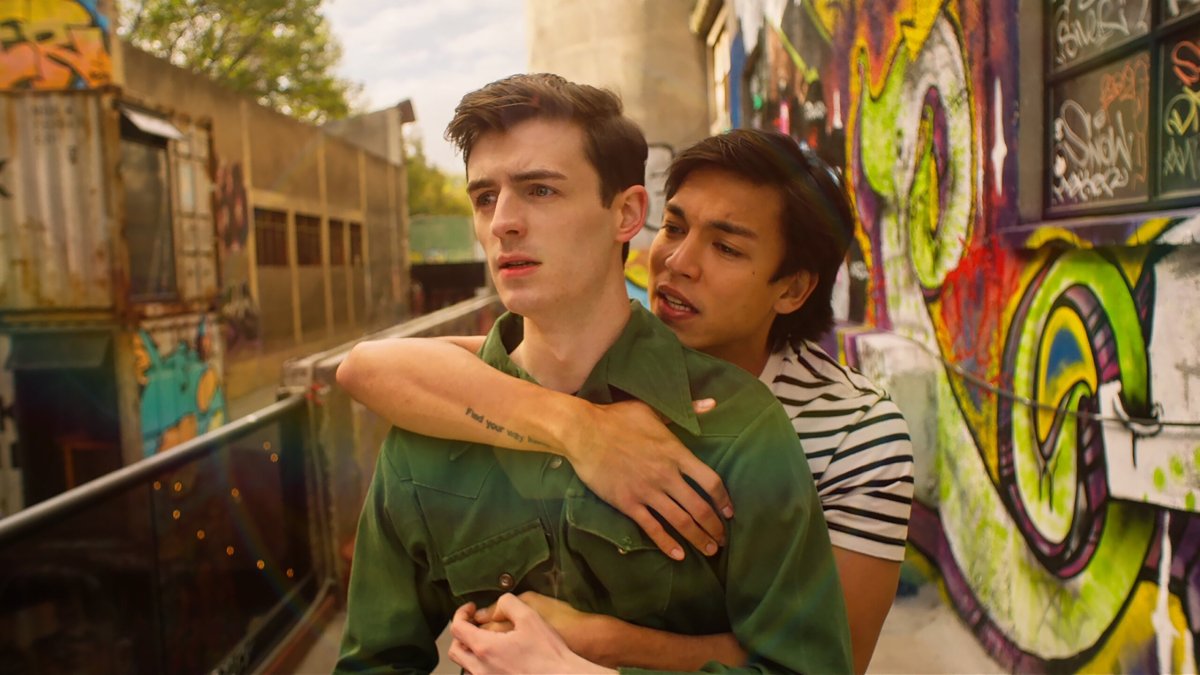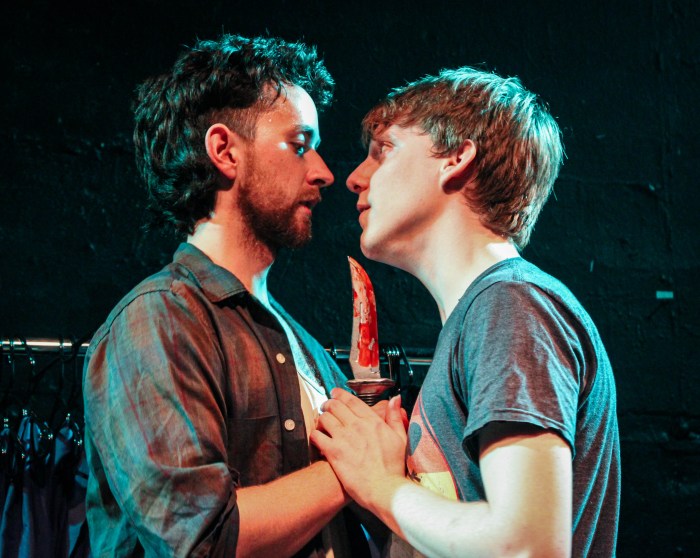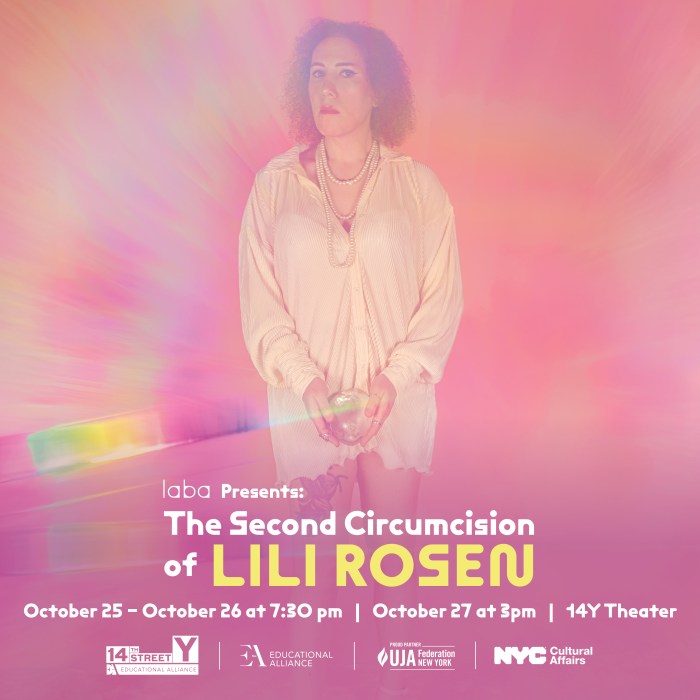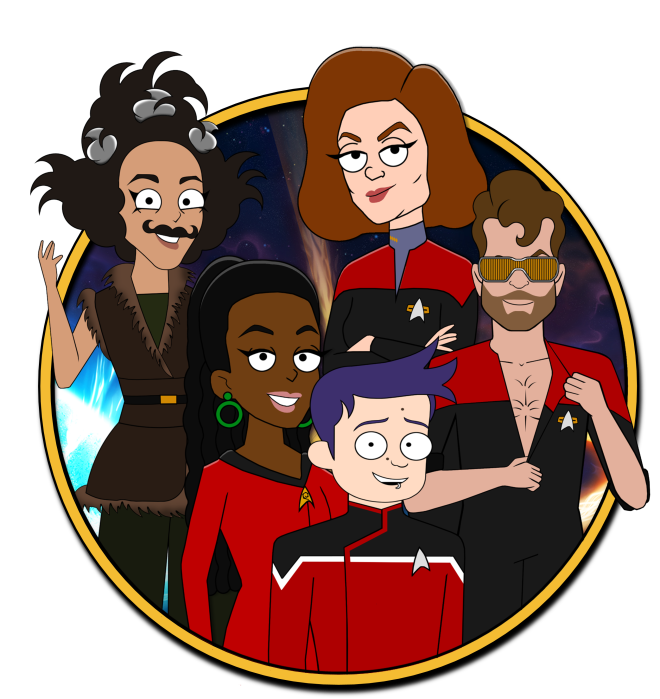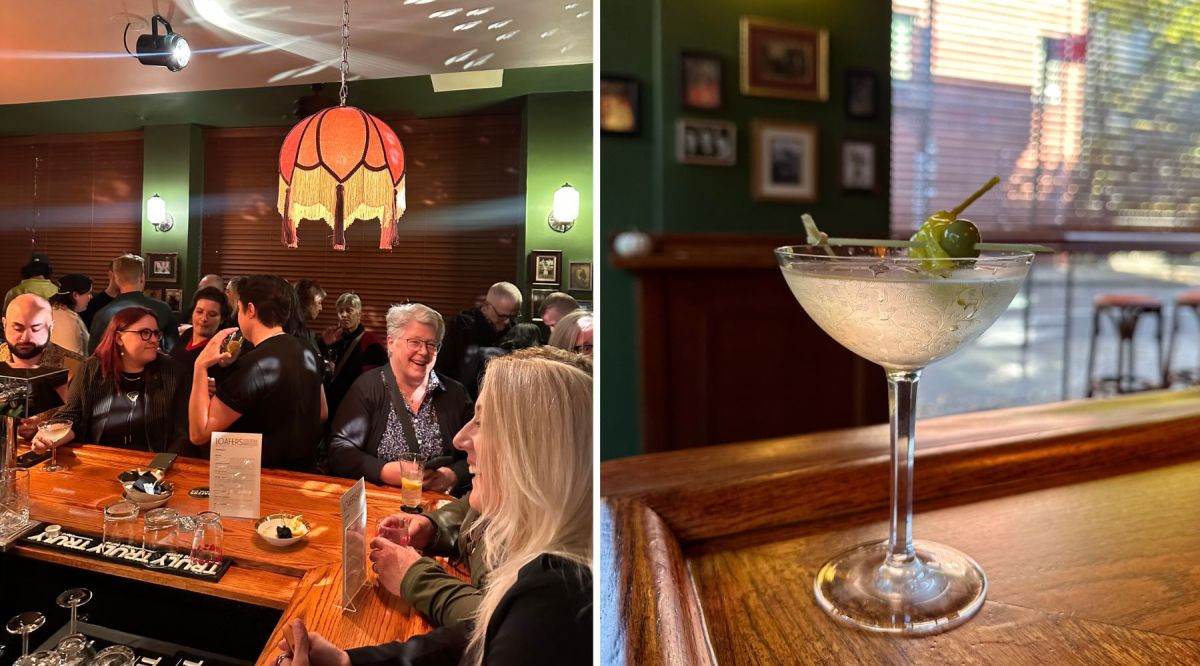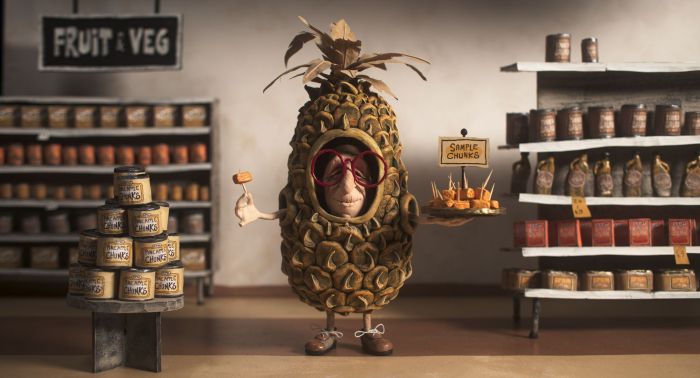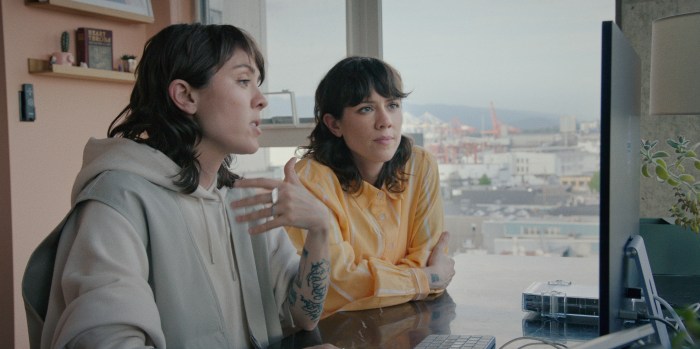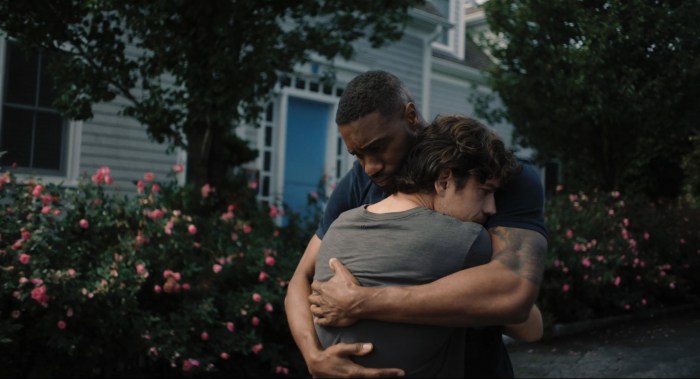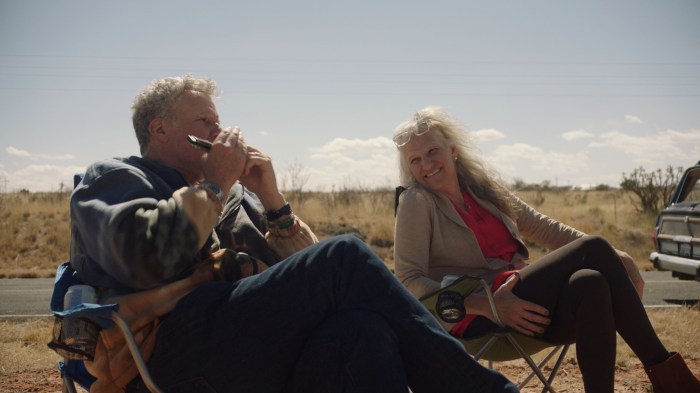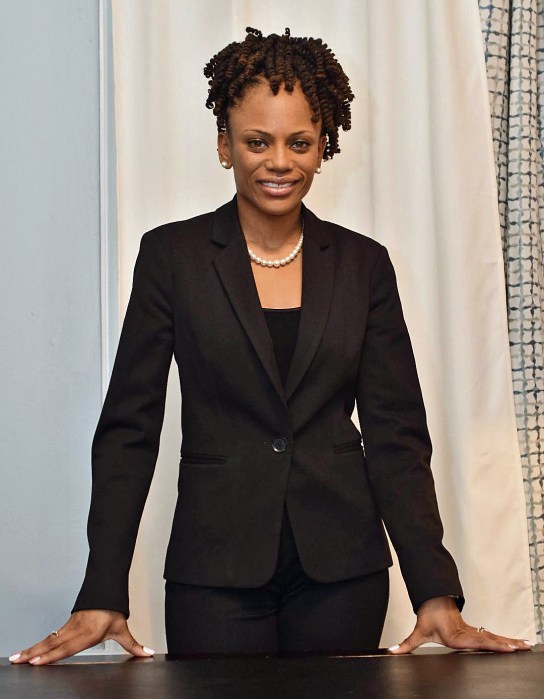An infectious musical fantasia, “Glitter & Doom” is a sweet romance about the title characters, Glitter (Alex Diaz). who wants to run away and join the circus, and Doom (Alan Cammish), who dreams of performing his music at a local nightclub. The guys meet cute at a club and perform many catchy musical numbers. (The film’s songs are all from the Indigo Girls catalog, and both Amy Ray and Emily Saliers have cameos.)
As the guys fall in love, go camping, and make love, they also share their anxieties and dreams. Yet both Glitter and Doom also have to deal with their strong-willed mothers (Ming-Na Wen, and Missi Pyle, respectively).
This visually striking film features fabulous performances from the energetic Diaz and Cammish, who spoke with Gay City News about making “Glitter & Doom.”
Can you describe a song or a lyric — not necessarily from the Indigo Girls — that has resonated with you or has a special meaning?
Alan Cammish: My normal answer, and it’s probably boring, is the Coldplay song, “Every Teardrop is a Waterfall.” There is a lyric in it that is very simple, “I’d rather be a comma than a full stop.” There is something about that that hits me. We can all feel not great, but carrying on is the most important thing. Why would we stay in the dark when we can carry on into the light?
Alex Diaz: There is a song that I used to listen to when I was really young and just starting out in the industry by Louis the Child, called “Fire.” It goes, “I’m building a fire, fire/ I’m building it higher, higher/I’m going to run this empire, empire/And if I go down in flames, the smoke gonna spell my name.” It was my mantra whenever I felt the odds were against me in this Industry, where the competition is stiff. It would hype me up so hard.
Alan Cammish: I thought of an Indigo Girls example that is my favorite — “Least Complicated.” The lyric at the end of the chorus is, “What makes me think I can start clean slated/The hardest to learn was the least complicated.” What a poetic way to say we overthink everything! Amy and Emily are such poets. That one resonates with me massively.
How did you lean in and express your character within the film’s different narrative layers?
Alan Cammish: I always see Doom as someone who never really got to have much of a childhood. He grew up very quickly. His music is a way for him to let that out, and the longing he had for the support for his mother and something stable in his life. It comes from a really raw place. Rather than being a hobby he is pursuing, it a true need to release emotion. It’s not just the professional side of things, it is almost a cure to a mental health struggle in a way.
Alex Diaz: For Glitter, the one thing he carries through whether he is performing, or on video, or talking to Mama Bird (Ming Na-Wen), or Doom, he has this softness to him, this openness, that I don’t have. He can have somebody completely turn down a decision of his and still deal with them so tenderly. When he’s taking to Doom, he’s so light. You deal with so much resistance just being queer. It either hardens you or gives you the biggest softness when you deal with the world. Glitter is the epitome of that, so he shocks me in the way he handles situation and rejection.
I appreciated that neither Glitter nor Doom has issues with their sexuality and were able to be authentic. Can you talk about the way sexuality is used and presented in the film?
Alan Cammish: Even though attitudes towards queer people are shifting so radically — not in all areas, but in the sort of Hollywood mainstream — we cling to sad narratives like the difficult coming out story, and tales of homophobia to varying degrees. It was really refreshing to be able to exist in a world that was so embracing of different gender identities, different sexualities, different ethnicities, and races. We had a very diverse group of people both in front of and behind the camera, which added to this idea of a queer utopia where everything is kind of unspoken and beautiful without having this this narrative of “overcoming.” It is the “after” of what this world looks like if we didn’t have to deal with these things. It was really fun to be around every day.
Alex Diaz: When it was presented to us, it was a fantastical romance in a world where everything was accepted. There were no straight people and no resistance to being open and loving and being weird. That is what makes the world so colorful. They were mishmashing all these wardrobes and set designs. It is how the world should be. We shouldn’t be gatekeeping — this is for us, and that’s for you, and you can’t do this because you’re this way. No matter how strong the fight for equality and freedom.
Both Glitter and Doom have fraught relationships with their mothers. Neither has a father figure. What observations do you have regarding the depictions of masculinity?
Alan Cammish: This film really does showcase male fragility, which I think is rarely explored. It contrasts it with very strong femininity, both in positive and negative ways. Doom’s mom is a chaotic character and has a lot of strength but doesn’t know how to harness that for good. She has the right intentions. The whole film is dealing with the delicate balance of feeling confident and strong and grounded and feeling lost and fragile and like you need connection. That is reflected in both the romance and in the mother/son relationships.
Alex Diaz: I saw it as a lot of interpretations of wounded masculinity and how these characters, with the absence of a father, were able to heal their own masculinity and push through. That is a divine masculine trait to push through and persevere and be courageous — to tell your mom, “I love you this much,” and my love for myself and my self-actualization can coexist. It is not about being masculine but finding that balance within you. The film shows that in how the two characters pursue that regardless of their fear.
The scenes of Glitter and Doom camping were my favorites. But I am so not a camper. Are you into camping? Or just into being camp?
Alex Diaz: They were more glamping scenes.
Alan Cammish: I hate camping. I have tried to be that person, but I can’t. It is an absolute no for me. But I’ll camp it up every day of the week. Being camp is a lot easier to do in Mexico singing Indigo Girls songs with queer icons. I don’t think you can become campier than that! You just have to leave your house feeling you can completely embrace who you feel like that day. Some days I’m punky, sometimes I’m sunny and rainbow-esque, and it’s about allowing that to shine no matter who is around.
Alex Diaz: I love camping. It is something my older brother and sister and I would do for bonding. I grew up in Canada and we were close to Rockies and hot springs, and really nice trails. I’m a big camper.
Likewse, Glitter and Doom talk about being doers and dreamers. In what ways are you a doer and in what ways are you a dreamer?
Alan Cammish: I’ve always been a dreamer in the sense that I have always had a view of the big picture and what I want from my life in general. But I’m also task-oriented and I love a to-do list, ticking off the stages of a journey. That makes me more of a doer.
Alan Diaz: I’m very much, you gotta be delusional with your dreams and aim super high because even if you don’t make it, once you take it into perspective, you’re like, “I made it pretty far.” Being 5’8”, and Asian, and queer, and in the Philippines, I was dreaming a lot. Do I have what it takes? I came out in 2019 and instead of ruining my career, it pushed me further. Nothing can stop me now. It is time to dream harder and do harder. This film is a testament to my ability — and Alan’s — to stick to our dreams.
“Glitter & Doom” | Directed by Tom Gustafson | Opening March 8 at the Quad Cinema | Distributed by Music Box Films.

